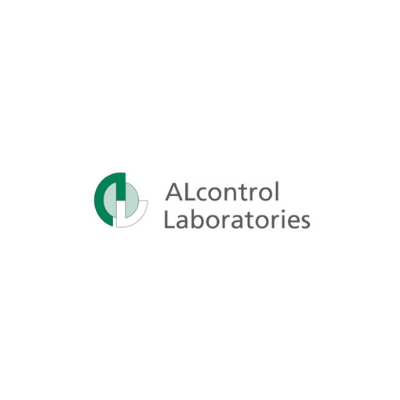Sarah Hopgood, Operations Support Manager – Protections at Covéa Insurance discusses the impact that Business Benchmarking, ServCheck and ServiceMark accreditation have had.
Sarah Hopgood, Operations Support Manager – Protections at Covéa Insurance discusses the impact that Business Benchmarking, ServCheck and ServiceMark accreditation have had.

Sarah-Jane McCausland, Customer Communications & Engagement Lead at Covéa Insurance discusses what it means to be a long-standing member of The Institute, the networking opportunities, and the impact of ServiceMark accreditation.
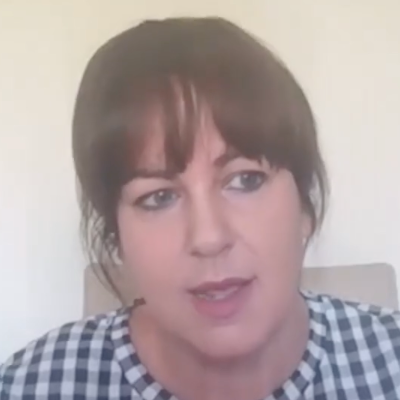
Watch Andy Pymer, Executive Director of Finance and Regulation at Wessex Water, highlight how membership and ServiceMark with Distinction helped them achieve a high rank in Ofwat’s Customer Measure of Experience and Developer Services Measure of Experience league tables.

Watch Dean Anderson, Customer Experience Manager at Edinburgh Trams, share how ServiceMark and Professional Qualifications, among other membership benefits, have helped them consistently grow their customer base over the last 7 years, increase colleagues and customer satisfaction, reduce complaints handling and increase employee retention.

Alan Letford, Head of Customer Care, shares his experience of using Business Benchmarking to identify key areas for improvement and embed a culture of excellent customer service at Bobst.
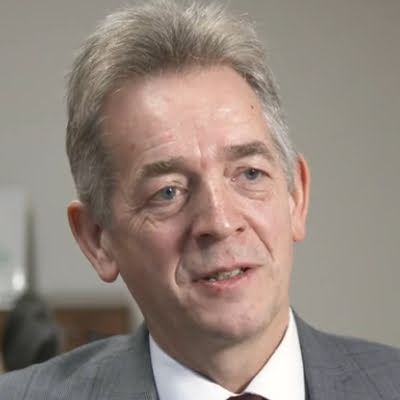
Watch Gary Lewis, CEO of The Travel Network Group, highlight the benefits of membership and using Business Benchmarking to improve emotional connection with their members.
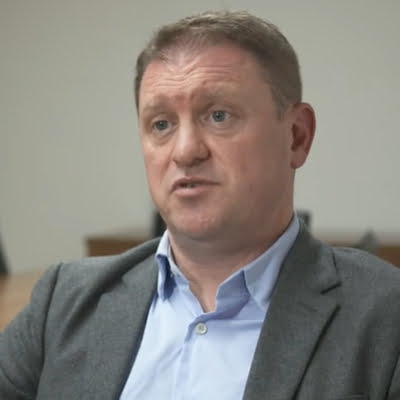
Whether at home or at work, we all rely on the power supply to keep us going about our day to day lives. Maintaining the power network is therefore a big responsibility, requiring rapid response and high levels of customer service when issues arise.
One distribution network operator (DNO) with a large customer base spread across two distinct geographical areas is SP Energy Networks. The organisation looks after the power supply to some 3.5 million households in Central and Southern Scotland and in Merseyside, Cheshire, North Wales and North Shropshire. This involves maintaining around 40,000km of overhead lines and 65,000km of underground cables, no small task!
SP Energy Networks has a team of 1,500 field engineers who interact directly with customers when an issue needs resolving or networks need to be maintained, and a contact centre team of around 65 people who handle phone calls, emails and other communications from and with customers.
The contact centre handles some 1 million calls a year, with daily volumes varying significantly depending on whether or not a power interruption arises. If a storm damages the supply network, calls can shoot up from the daily average of 1,500 to as many as 80,000. The contact centre runs itself like an emergency service with normal phone call response times impressively low, at under 10 seconds.
“Providing outstanding customer service is a major priority for us,” says Kendal Morris, General Manager Customer & Social Delivery at SP Energy Networks. “We have to be ready to deal with a wide range of enquiries. If there is a power cut or fault, then of course customers can be quick to contact us. But we also proactively contact customers ourselves especially our more vulnerable customers, for example, if there is planned maintenance due to the supply in their area. Customers also contact us for new connections or with general enquiries, which can be anything from reporting graffiti to requesting some earthing work in their property.”
The majority of customer contact, apart from face to face in the field, is done by phone. However, queries also come via email and contact forms from the website. The company also runs various social media accounts and monitors and responds to enquiries through those channels.
In recent years, the business has significantly increased its focus on customer service, as Kendal explains: “Our CEO Frank Mitchell recognised a number of years ago that a culture change was needed across the organisation to ensure decisions were made with our customers at the heart of every plan and action. We are an engineering business and it is really important our engineering standards are high, however decisions need to be made from a customer service perspective.”
This service emphasis is also important because, as a regulated business, every customer contact that SP Energy Network has is passed to a third party and scored. The business needs to achieve at least 8.2 points out of 10 on average to avoid a financial penalty and so customer satisfaction needs to be exceptional.
Satisfaction scores have risen year on year over the last 8 years which shows the strategy is working and customers are receiving an excellent service.
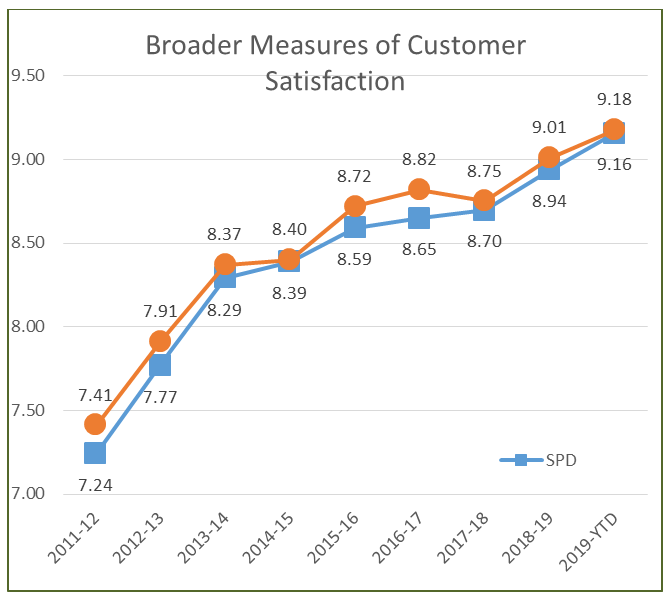
Kendal said “as part of our customer service strategy SP Energy Networks joined The Institute of Customer Service. Over the last two years, the business has rolled out customer service training via The Institute’s Academy, with around 200 staff members having been through the programme to date.
The Academy has delivered FirstImpressions customer service training to staff as well as ServiceManagement training which is designed for managers and team leaders.
The training we’ve done with The Institute has definitely helped us enhance our customer service focus,” Kendal says. “It reinforces a customer culture and provides a consistent platform. It’s also really effective in bringing people together who might not work directly with each other on a day-to-day basis and building a team mentality, while the project work involved extends the learnings and embeds them further. It also means that we can provide customer service qualifications to staff, where previously the business only really invested in engineering and technical qualifications, so that’s an important benefit for many of our people.
One of the most valuable parts of membership for the business is the annual benchmarking exercise that The Institute conducts. The most recent benchmarking in February 2019 gave SP Energy Networks a customer satisfaction score that was 1.7 points higher than the top organisation in The Institute’s UK Customer Service Index.
We were very pleased to have such a good score of course,” Kendal reflects. “Network Operators like ourselves aren’t included in the UKCSI itself because of the ambiguity it would create with frontline energy suppliers (they people you pay your energy bill to). But our score enables us to benchmark ourselves against businesses outside our industry and shows us that we’re on the right track .”
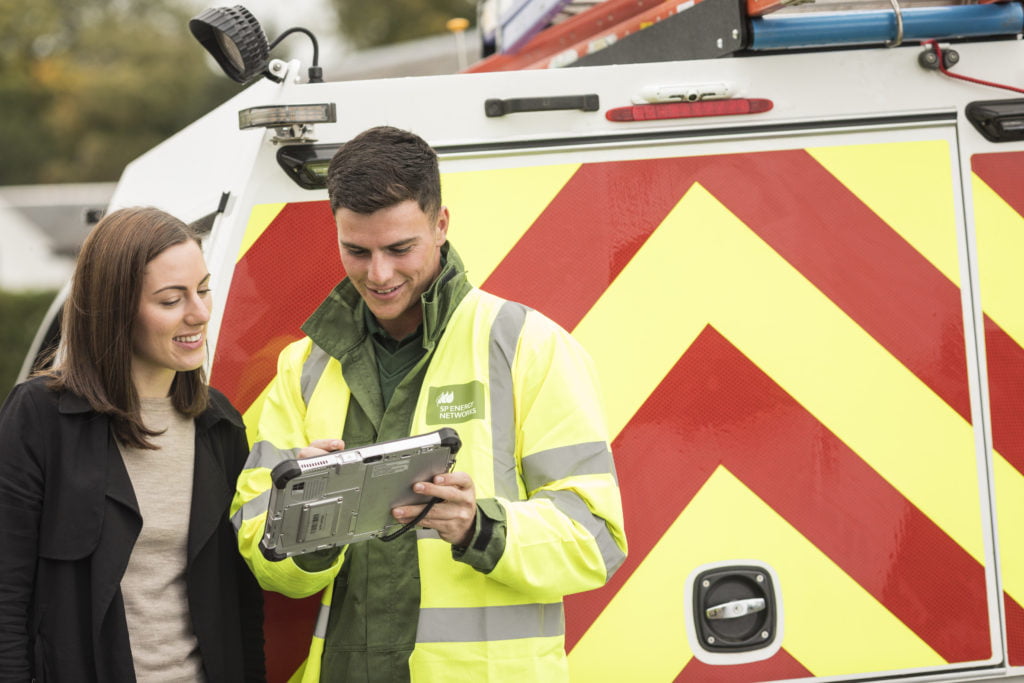
One area that has become increasingly important to the company, as well as regulators, is supporting vulnerable customers. Customers can register across 30 different categories of vulnerability for support during a power interruption. Of the 3.5 million households SP Energy Networks serves, some 980,000 customers have registered for support.
“We need to identify customers in vulnerable circumstances because obviously any power cut or interruption to supply could have serious consequences for some individuals,” Kendal explains. “We engage in proactive outreach to identify vulnerable customers and also partner with charities and other organisations who provide services that may help them. We offer services to our customers far wider than customers may expect from a network operator such as befriending services, benefits checks and dementia support.
Developing specific training for our staff to support those with vulnerabilities has become an important focus for us, whether we develop and deliver that training ourselves or with The Institute or another organisation.
Meanwhile, we look forward to continuing our membership of The Institute and working together to keep driving our customer satisfaction scores as high as we can get them.”

Dean Anderson, Customer Experience Manager at Edinburgh Trams, discusses why benchmarking his organisation’s performance against others drives higher levels of customer satisfaction and service.

As autumn advances and the nights draw in, we all begin to switch our heating on to take the chill out of the air. But instead of wall-mounted radiators, more are turning on underfloor heating , a system that emits an even warmth through the floor.It’s something that’s becoming more widespread, and not only with more people pursuing self-build dreams of the type made popular by the TV show Grand Designs. It’s more affordable than some might think, costing around the same as luxury radiators, is more efficient and does away with those irritating cold spots! Based in Honiton, Devon, Nu-Heat is the UK’s largest supplier of designed underfloor heating systems.
The company started out in 1992 employing just a handful of people and is celebrating its 25th anniversary this year with a team of more than 100. With over 70,000 systems installed, the company has also branched out into integrated renewables such as heat pumps and solar thermal systems.Nu-Heat designs bespoke systems for each project, working from house plans, and as well as single new build or renovation jobs, also works on bigger trade and commercial developments. The company works with a network of registered installers around the country.
Customer service has always been important to the company and in 2014 it formalised this by becoming a member of the Institute of Customer Service. Christian Oram, Sales and Marketing Manager at Nu-Heat, explains: “We’ve always looked at the customer service journey throughout the process from first contact through to completion of a job. We pride ourselves on being an ethical sales company that takes a very consultative approach.
The industry has become more competitive over the years and we realised that bringing customer service to the forefront of what we do will improve customer satisfaction and give us a real competitive advantage. It is another way we can stand out from the crowd. The difference between eight out of ten and nine out of ten for customer satisfaction is huge.
On joining the Institute, Nu-Heat ran an initial benchmarking survey both externally and internally. The external results were pleasing, with a customer satisfaction score of 84.6%. Internally, however, it was much lower at 62.7%.”We realised that we had much more to do on the internal side,” Christian says. “Whether we were just being too harsh on ourselves, or whether we were not in fact communicating well enough through the company about the emphasis we place on customer service, it gave us the spur to up our efforts. So we began to increase the visibility of our customer service policies and processes, including beginning a formal feedback process internally for service challenges and successes.”
That wasn’t all the company did, though. “We also set up a Customer Service Steering Group, made up of Board members and senior management (including myself). The Steering Group sets strategy, looks at high level customer service challenges and discusses root causes. Then we created a Customer Service Focus Group made up of people from across departments to develop and implement any changes to our processes. In addition, we created internal customer service champions, started a recognition scheme and began sending out monthly customer feedback emails to all of our people.”
Nu-Heat then worked towards The Institute’s ServiceMark accreditation, and successfully gained it in December 2016. It is the only heating company in the UK to hold the accolade. Not only that, but the company achieved a Distinction, one of only a handful of companies in any sector to do so. The company’s external score had risen to 88.8% – a satisfying increase given that it was already starting from a high score, while the internal score shot up to 88.9%.
“We were very pleased with this,” Christian says, “but we want to keep pushing ourselves to do better! We’d love to get to 90%. That’s why we’ve now embraced a ‘9 out of 10’ initiative where every member of staff sets themselves an improvement goal that would help us get to that 9 out of 10 score. It can be something big or small. For example, my first one was ‘Don’t interrupt people’ as I had a habit of doing that! My current one is ‘Establish a structure and process so everyone in my team is clear what their role is’. People have really embraced it well. Since joining The Institute, the customer service ethos has become firmly embedded in the company”.
Through following the advice of their Client Services Director at The Institute, every member of Christian’s 40-strong Sales and Marketing team, for example, has a customer service objective amongst their 4 or 5 key personal performance objectives for the year. The company’s HR manager has also become an accredited trainer to deliver The Institute’s FirstImpressions customer service training programme, and all of Nu-Heat’s people have been through it. “We’ve caught the training bug now!” Christian laughs. “FirstImpressions was our first company-wide learning and development training and now we’re rolling out leadership training too.” The company also actively participates in National Customer Service Week (1st week of October) with a variety of team-building and recognition activities through the week. “We’ve taken part for the last three years now,” Christian says. “It’s something we look forward to and everyone can enjoy.”
Christian is also clear that there has been a real return on investment for Nu-Heat from working with The Institute. The company has grown market share steadily through the last three years. Externally, repeat business on the trade side has grown by around 15%. Internally, as engagement scores have risen so sick leave has dropped significantly down by around a half. “There’s no doubt that membership has been really good for us. We make the most of it, with our ServiceMark Distinction accreditation on all our quotes, our website, our brochures and our trade show stands. Customers notice it and comment on it. It’s a point of differentiation, a real USP. Internally too, it has proved its worth. People like working for a company that is genuinely trying to be the best it can be. They want to be a part of that and are motivated when they can see you are listening to them and valuing their point of view.”
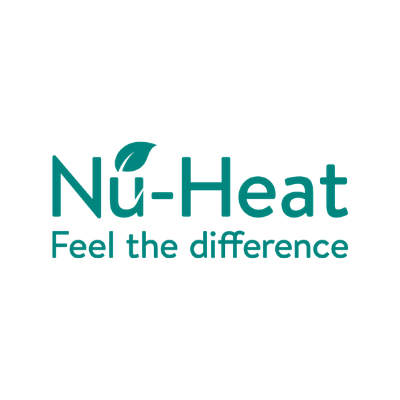
The company’s Food & Water division, with 5 sites throughout the UK, is one of the UK’s biggest testers, carrying out some 8 million tests annually. Open for business 365 days of the year, and often needing to test into the early hours in order to meet customer deadlines, the work is fast-paced and can have unpredictable peaks.
The division’s work plays a hugely important role as part of a safety regime which protects and informs the public, testing that food is safe and contamination-free, checking and verifying nutritional claims and labelling (including for example that a product is ‘nut-free’), and substantiating the authenticity of food products too, think of the horsemeat scandal from a few years past.
Around 80% of the division’s work is food testing, with the other 20% involving testing the quality of water (important for water processing plants or for renal units, for example, in hospitals). “A demanding environment.” Mike McCorkell, Managing Director of the UK Food & Waters division at ALcontrol, explains: “We have 50 vehicles that collect food samples from manufacturers daily and for food safety tests we have to process them straight away. Most of our testing is pre-scheduled but even so we don’t usually know until the day it’s actually due to arrive what the volumes will be. So it can be quite pressured getting through the work and we rely considerably on the engagement, flexibility and goodwill of our staff to get the job done well. Not only can the work be pressured for staff, but the results can also lead to high stress situations for their customers. Listeria for example, in a manufacturer’s sample, then we have to break what is obviously a piece of very bad news to them,” Mike comments, “You’ve got to do that in a sensitive and human way , one of the areas where the need for excellent customer service really comes in.”
It was four years ago when the company was consolidating some of its sites that it really occurred to Mike that a radical change to a more customer service focused approach was needed. “We were in danger of being too transactional in our dealings with customers, treating the work like a Lean production line. Our organisation was perhaps somewhat introverted as well, working hard under the bonnet but not communicating enough with customers in an engaging way. Mike recruited an experienced service and engagement expert, Julia Bloomer, from the steel industry (another tough industry, fighting hard for marginal gains) to supplement his team and together they set ALcontrol off on what has been a fruitful and rewarding journey.
Julia had experience of The Institute of Customer Service from her previous role, and enrolled the Food & Water division as a member too. Since 2013, the company has made wide use of The Institute’s products and services, including putting many of its staff through training programmes, such as FirstImpressions and ServiceManagement, using Business Benchmarking putting leaders and managers through Institute training qualifications for Communication, Solutions, Innovation and Coaching obtaining one of The Institute’s most prestigious accreditations, ServiceMark.
ServiceMark requires an organisation to carry out a survey of its employees to benchmark engagement; a survey of customers to gauge their level of satisfaction; and have an independent assessment carried out by an Institute representative. All three components require challengingly high scores in order to achieve the accreditation.
Julia Bloomer says: “There’s no doubt that being members of The Institute has really paid off for us. It’s benefited us in lots of different ways. Obtaining ServiceMark was the icing on the cake if you like, although for me the most important thing isn’t obtaining the accreditation, it’s the journey to get there and the things you learn along the way. The journey is still ongoing too. We’re the only commercial laboratory in the country to have ServiceMark so it stands out as a truly independent verification of our standards. Some of our competitors promote in-house survey results but without any facts or confirmation, so it’s a great achievement for us.”
And it’s not just a nice piece of paper or a plaque for the company to display, it has led to real return on investment. The food testing industry is a price sensitive marketplace, and margins are low. Getting fairly rewarded for work and making a sustainable profit can be challenging. Obtaining ServiceMark along with other Institute programmes, and achieving the underlying service standard that enabled this, has helped the company to swim against the tide on price. What it’s done for us is given us the knowledge and the confidence to increase our pricing in a fair way, knowing that our customers recognise our service offering too and will stay with us. So it’s had a direct commercial benefit,” Julia says.
Other programmes have led to financial benefits as well. “In the FirstImpressions training course, you have to come up with an actionable plan to improve an aspect of the business. One lady came up with a suggestion to plug a previously unseen revenue leakage around the way we invoice for agreed carriage charges which led to a £10,000 increase on the bottom line every month,” Julia says. “The training people go through has given them a voice and a sense of people power, that’s a return on investment in itself.” Putting the focus on customer service has paid off in multiple ways. Customer retention now stands at 95% compared to 85% four years ago; the average selling price per test has increased year on year for four consecutive years; employee retention has also increased; while the average employee engagement score has risen from 50% in 2012 to 84% now.
“We’ve had a seismic cultural change,” Mike McCorkell observes. “We have a much improved workplace where people enjoy their jobs and are proud to tell their friends and family what they do at work. It is pleasing that when customers visit or audit they pick up on the vibe and comment on it and can see that we’re doing a good job. I’m proud to say that we love to let customers loose on site!” Julia adds. “We can let them stop and talk to anyone, anywhere. I don’t know how you put a price on that. Around 75% of the company’s 420 staff have now been on at least one Institute training programme and the aim is to get that to 100% in time. We benchmark ourselves with great service leaders in other industries, not specifically the food testing business which perhaps is less mature in developing service leadership,” Mike says. “I think we’ve created something quite unique, we’ve built a strong ethos around being a great place to work dedicated to great service, creating quality opportunities and careers for people.”
Other divisions in ALcontrol are now on the same journey, adopting a similar customer service focused approach and working to the same ‘value cycle’ where engaged staff drive great service helping the business gain a fair price and sustainable profitability. A commitment to customer service is now deeply embedded.
